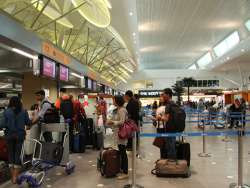Airlines may soon bar passengers from carrying laptops in check-in luggage: Report
On the other hand, in case of hand bags, cabin crew are being trained to handle PED fires as soon as anyone notices emitting smoke from the bag they are kept in.

Air passengers may soon be banned from carrying large personal electronic devices (PED) like laptops in check-in luggage, amid fears that their battery fie would go undetected, leading to drastic consequences, says a Times of India report.
On the other hand, in case of hand bags, cabin crew are being trained to handle PED fires as soon as anyone notices emitting smoke from the bag they are kept in.
The probable move by India’s aviation regulator comes after a spate of incidents involving mobile phones catching fire mid-air. Last week, a mobile phone caught fire on a Delhi-Indore flight which was quickly controlled by the cabin crew.
“Several international aviation agencies have started considering banning big PEDs from check-in bags. Once a decision is taken by any leading aviation agency, India is going to follow suit,” a senior DGCA official was quoted by Times of India as saying.
Electronic devices like portable mobile chargers, power banks and e-cigarettes are already banned in check-in luggage in India.
The International Civil Aviation Organisation (ICAO) is currently working on a paper, examining the dangers posed by PEDs carried by passengers and crew. The American Federal Aviation Administration (FAA) has submitted its test results in this ICAO paper, and arrived at a conclusion that PED kept in cargo hold “could lead to loss of aircraft”.
"FAA fire safety branch conducted 10 tests utilising a fully charged laptop computer inside a suitcase. A heater was placed against a lithium ion cell in the battery of a laptop to force it into thermal runaway.... it was concluded that if a PED is packed in a suitcase with an aerosol can and a thermal runaway event occurs, there is the potential for an aerosol can explosion.... (In some cases) the fire suppression system of the aircraft is then compromised, which could lead to the loss of the aircraft," the paper of ICAO, a UN agency, said.
It must be noted that electronic devices in passenger cabin are comparatively safer in the cabin crew, as it enables the crew to take immediate action.